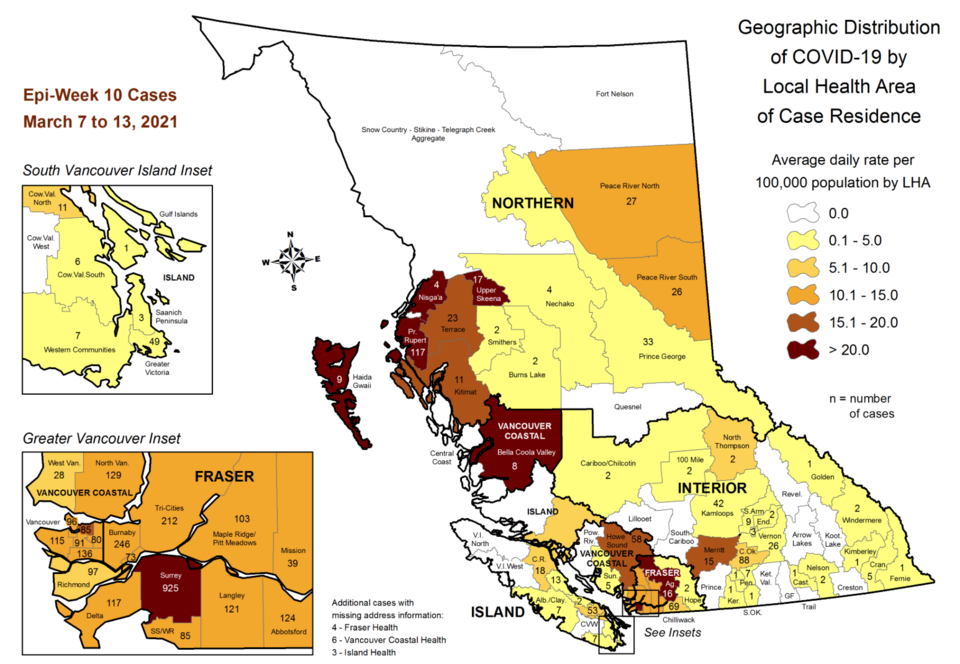The health region including Whistler recorded 58 new cases of COVID-19 between March 7 and 13, according to the BC Centre for Disease Control.
The transmission rate is up from the week of Feb. 28 to March 6, when 32 new lab-confirmed cases were tallied.
"We are seeing a move of numbers in the wrong direction in Whistler again. Please remain vigilant," urged Whistler Mayor Jack Crompton in a public Facebook post Wednesday, March 17.
Comprising Whistler, Pemberton, Squamish, Lions Bay and parts of the southern Stl’atl’imx Nation, the Howe Sound health region tallied a total of 1,406 cases between Jan. 1, 2020 and Feb. 28, 2021.
This is the second week with no Whistler-specific case numbers, which Vancouver Coastal Health (VCH) had been sending out in recent weeks as the resort contended with an outbreak. Notably, VCH does not typically share numbers in small communities when the caseload falls under a certain threshold in order to protect medical privacy.
The health authority’s most recent update for Whistler, on March 4, said the resort recorded 18 new cases between Feb. 22 and 28, 26 cases the week prior, and 56 the week before that.
That bulletin also noted that Whistler had tallied 720 cases since Jan. 1, of which 699 had recovered.
Vaccinations began this week for seniors aged 80 and up as well as Indigenous people aged 65 and up. Immunization appointments can be booked by calling 1-877-587-5767. The phone line is open daily from 7 a.m. to 7 p.m.
Whistler Blackcomb has also confirmed that employees living in staff housing began receiving vaccines this week, part of the province’s effort to protect workers in areas where there have or are outbreaks ongoing and who live in shared quarters.
In his community update yesterday, Crompton also noted that VCH "will be vaccinating Whistler community members living in shared staff and high-density housing, a segment of our community that has seen the highest rate of COVID-19 transmission," seeming to indicate workers living in shared housing outside of Whistler Blackcomb would be immunized as well. Pique has requested more information from VCH, and will update the story once we hear back.
In a March 15 joint statement, B.C.’s provincial health officer Dr. Bonnie Henry and health minister Adrian Dix said that the initial shipment of the AstraZeneca/SII (AZ/SII) vaccine will be used to “protect workers in industries where full use of personal protective equipment and barriers can be challenging, outbreaks and clusters have occurred or are ongoing, and workers must live or work in congregate settings.”
Health officials and WorkSafeBC have identified worksites with the highest risk of COVID-19 transmission, which include food processing plants, agricultural operations, large industrial camps, and “other large congregate living settings for workers where isolation and quarantine is difficult,” according to the joint statement.
“Immunizing workers in these settings will not only protect workers, it will also protect the communities around them, including many rural, remote and Indigenous communities."
Some have questioned B.C.'s vaccine rollout, particularly first responders who have lobbied to be prioritized for immunization.
"The National Police Federation fully supports British Columbia's effort to roll out vaccines in a safe and appropriate manner—including prioritizing our colleagues in health and social services—but our own 6,500 BC-based Members must also be included for priority access in Phase 2. This is the only way to ensure the safety of our officers and the communities they serve," National Police Federation president Brian Sauvé said in a March 12 statement.
After this article was published on Thursday, the Premier's Office announced that B.C.'s 300,000 frontline workers, including first responders, school teachers and grocery store employees, would be getting vaccinated in the coming weeks.
“We know how challenging this pandemic has been on our frontline workers,” said Premier John Horgan in a release. “Many of these people have come to work throughout this pandemic, continuing to teach and care for our children, stock the shelves of our local grocery store and keep our communities safe. By immunizing these front-line workers, we are making workplaces and communities throughout our province safer.”
Beginning in April, people in priority groups will start to receive their first dose of the AstraZeneca/SII COVISHIELD (AZ/SII) vaccine. These groups include:
- first responders (police, firefighters, emergency transport);
- K-12 educational staff;
- child care staff;
- grocery store workers;
- postal workers;
- bylaw and quarantine officers;
- manufacturing workers;
- wholesale/warehousing employees;
- staff living in congregate housing at places such as ski hills;
- correctional facilities staff; and
- cross-border transport staff.
These sectors are being prioritized in addition to the workplaces where vaccines have already being used to assist with outbreak response.
"The additional supply of the AstraZeneca/SII vaccine allows us to strategically target immunizations to maximize the protection of our province,” said Henry in the release. “With each person who receives any of our three safe and effective vaccines, we are all that much safer. This targeted outreach builds on the momentum we now have with our age-based program to protect those who have been at work every day, without break and without question, for the past year.”
Health officials said they expect to receive approximately 340,000 doses of the AstraZeneca vaccine by the end of May.
In total, B.C. expects to receive approximately 340,000 doses of the AstraZeneca vaccine by the end of May 2021.
Booking arrangements for frontline workers will be established in the coming weeks and will be communicated directly to each specific sector, the government said.
This article has been updated since publication.




